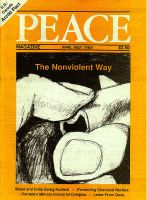
Peace Magazine Apr-May 1988, page 15. Some rights reserved.
Search for other articles by Eva Torok here
The Geneva Protocol of 1925 prohibits the use of chemical weapons, and has made their use subject to international legislation. This point was raised at a chemical warfare forum at the United Nations on October 29, 1987, sponsored by the United Nations Department for Disarmament Affairs and the Non-Governmental Organization Committee on Disarmament.
In his opening remarks, Ambassador Rolf Ekeus of Sweden pointed out that prohibiting the use of chemical weapons does not preclude their production and storage. Ambassador Ekeus, as Chairman of the Ad Hoc Committee on Chemical Weapons of the Conference on Disarmament in Geneva, has been negotiating to exclude the use of chemical weapons by setting up a system by which nations would undertake not to produce or retain stockpiles of such weapons. There are 40 member nations in the Conference.
The Conference on Disarmament now has a draft text which it has been refining since 1984, and which it hopes will become a full-fledged treaty text to be signed and ratified by all the nations in the near future. By signing this treaty, the nations would in effect enter a Convention which brings chemical weapons and all aspects of their production under strict international control.
The text specifies that the signatory states should immediately declare all existing chemical weapons after the Convention enters into force. The declarations would be verified by an international system and on-site inspections. Within twelve months of the ratification of the Convention the destruction of weapons would proceed in a manner that would not diminish the security of any of the states concerned. Chemical production facilities would also be declared, subjected to international on-site inspection, sealed, and made inoperable over a ten year period, after which time there would be no more chemical weapons, nor would any more be produced.
"Challenge on-site inspections" would be one means of assuring all parties to the Convention that treaty violations could not take place. A state believing another to be violating the treaty can request an on-site inspection which could not be refused by the state believed to be at odds with the treaty. Inspectors appointed by the Technical Secretariat of the Convention would depart immediately for the place indicated in the challenge to ascertain whether there is a violation of the Convention.
keus also pointed out the necessity of establishing a system to monitor the chemical industry beyond the ten year period to prevent the clandestine production of chemical weapons. Under the Convention the chemical industry would have to cooperate with a control system of data reporting to assure the world that violations of the treaty are not taking place. Such a system would have to be managed by an international authority having a scientific capacity and competence to fulfill the overseeing of the verification process as well as the future development of chemical sciences.
Regarding the progress of the negotiations, Ambassador Max Friedersdorf of the U.S. described as a "milestone" the Soviets' statement that they have chemical weapons. Of approximately 16 countries believed to be "possessor states," only the U.S. and the USSR have said that they own such weapons. A major event in Geneva was the Soviets' announcement that they are ceasing production.
Despite these developments and the successful bilateral negotiations that took place in 1987, several core problems remain to be addressed this February, such as dealing with countries who possess chemical weapons but who are not part of the forty member Conference on Disarmament. Another major difficulty will be to ensure -- without harming the peaceful chemical industry -- that chemical weapons will not be produced on the basis of the commercial chemical industry.
Ambassador Pierre Morel of France, one of the Non-Governmental Organization (NGO) respondents, raised the issue of security, a persistent concern with regard to the Convention. Because the present stock of chemical weapons is not the same in every nation, the transition phase could lead to an imbalance that would leave the biggest possessor in a central position. He advocated that a security balance be maintained during the ten year period by allowing each participating nation a security stock of 1,000 to 2,000 tons of chemical weapons. The stock would be homogeneous, under international control and for a limited period only.
John Barrett, the NGO respondent from Canada, commented on the measures NGOs could take before the implementation of the chemical weapons convention to ensure it is in fact implemented. The first task of the NGO community is to address the text to find areas where their governments can prepare the way for the implementation of the Convention. Raising the question of chemical weapons with the appropriate national authorities to ensure that the issue is being looked at is another step. Generating national discussion, political interest, and as a corollary, the political will to clear the way for the implementation of a convention would ensure that governments wholeheartedly fulfill their obligations under a treaty.These measures would build confidence among the signatory nations while fending off the security problem raised by Ambassador Morel. p

Peace Magazine Apr-May 1988, page 15. Some rights reserved.
Search for other articles by Eva Torok here